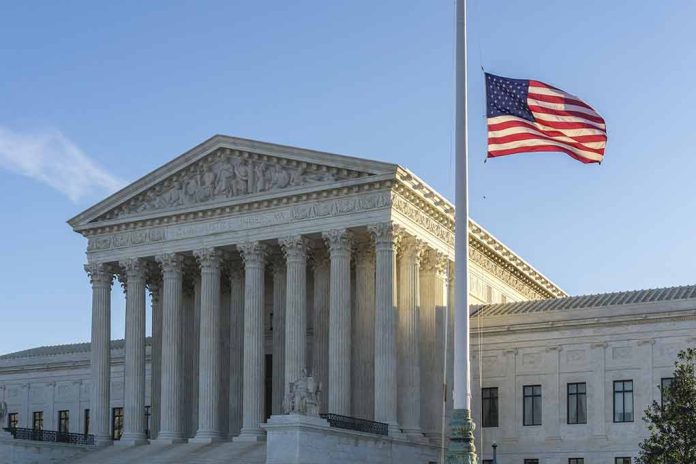
Chief Justice John Roberts issues rare rebuke defending judicial independence after Trump calls for judge’s impeachment over Venezuela deportation ruling.
Key Takeaways
- Chief Justice Roberts stated that impeaching federal judges over disagreement with their rulings is inappropriate and undermines judicial independence.
- Roberts’ comments were in direct response to President Trump’s call to impeach a federal judge who issued an order halting deportations to Venezuela.
- The Trump administration reportedly proceeded with deportation flights despite the judge’s order, claiming the flights had already left U.S. jurisdiction.
- Roberts emphasized that the proper channel for addressing judicial disagreements is through the appellate review process, not impeachment.
- The conflict has heightened political tensions, with a GOP lawmaker introducing articles of impeachment against the judge and Elon Musk declaring such action “necessary.”
Roberts Takes Rare Public Stand Against Political Pressure
Chief Justice John Roberts Jr. made an unusual public statement defending judicial independence amid growing political attacks. Roberts directly addressed the concept of impeaching judges due to disagreement with their rulings, calling such actions inappropriate in the American judicial system. His comments came in response to President Donald Trump’s recent criticism of a federal judge who ruled against the administration’s deportation of migrants to Venezuela, with Trump suggesting the judge should be impeached.
Without mentioning Trump by name, Roberts made his position clear: “The mechanism of impeachment was not intended as a means of addressing judicial decisions with which elected officials disagree”, said the Chief Justice. This statement marks a significant moment in the ongoing tension between the judiciary and political branches. Roberts rarely makes such public declarations, indicating the severity with which he views these threats to judicial independence.
Rare statement by Chief Justice John Roberts h/t @MelissaQuinn97
"For more than two centuries, it has been established that impeachment is not an appropriate response to disagreement concerning a judicial decision. The normal appellate review process exists for that purpose." https://t.co/rA0ViPoE55
— Natalie Brand (@NatalieABrand) March 18, 2025
The Venezuela Deportation Controversy
The dispute centers on U.S. District Judge Amit Mehta’s order to halt deportation flights to Venezuela. According to reports, the Trump administration proceeded with the flights despite the judge’s order, claiming they had already left U.S. jurisdiction when the ruling was issued. This defiance of a judicial order further escalated tensions between the executive branch and the judiciary, leading to Trump’s public criticism and calls for impeachment of the judge.
Roberts specifically addressed this controversy by emphasizing the proper channels for addressing such disputes, “Our constitutional system demands respect for judicial orders and provides appropriate channels of appellate review for those who believe a judge has erred”, declared Roberts. The Chief Justice’s comments underscore a fundamental principle of American governance – that disagreements with judicial decisions should be addressed through legal appeals, not by removing judges who make unpopular rulings.
Growing Political Pressure on the Judiciary
The controversy has gained significant political momentum. Following Trump’s comments, a Republican lawmaker introduced articles of impeachment against Judge Mehta. Elon Musk, the influential tech entrepreneur, publicly supported the impeachment effort, describing it as “necessary.” These developments signal an intensifying political challenge to judicial independence that Roberts clearly views as concerning for the constitutional separation of powers.
This is not the first time Roberts has defended the judiciary against criticism from Trump. In 2018, Roberts issued a similar statement after Trump described a judge who ruled against his asylum policy as an “Obama judge.” At that time, Roberts insisted, “We do not have Obama judges or Trump judges, Bush judges or Clinton judges. What we have is an extraordinary group of dedicated judges doing their level best to do equal right to those appearing before them.”
Constitutional Implications
The current conflict highlights fundamental tensions in the American system of government. The Constitution establishes impeachment as a remedy for “high crimes and misdemeanors,” not as a tool to override judicial decisions. Roberts’ intervention suggests serious concern that political officials might use impeachment to intimidate judges or influence future rulings, undermining the independence that allows courts to serve as a check on executive and legislative power.
Legal experts note that this conflict may eventually reach the Supreme Court itself, potentially forcing Roberts and his colleagues to rule on cases directly related to the authority of the judiciary versus the executive branch. The outcome of such cases could have far-reaching implications for the balance of power in the American constitutional system and the continued independence of federal courts from political pressure.
Sources:
US Chief Justice Roberts rebukes Trump’s attack on judge
Chief Justice Roberts Rebukes Trump Call to Impeach Judges for Rulings
Justice Roberts rebukes Trump’s call to impeach Venezuela deportation case judge







